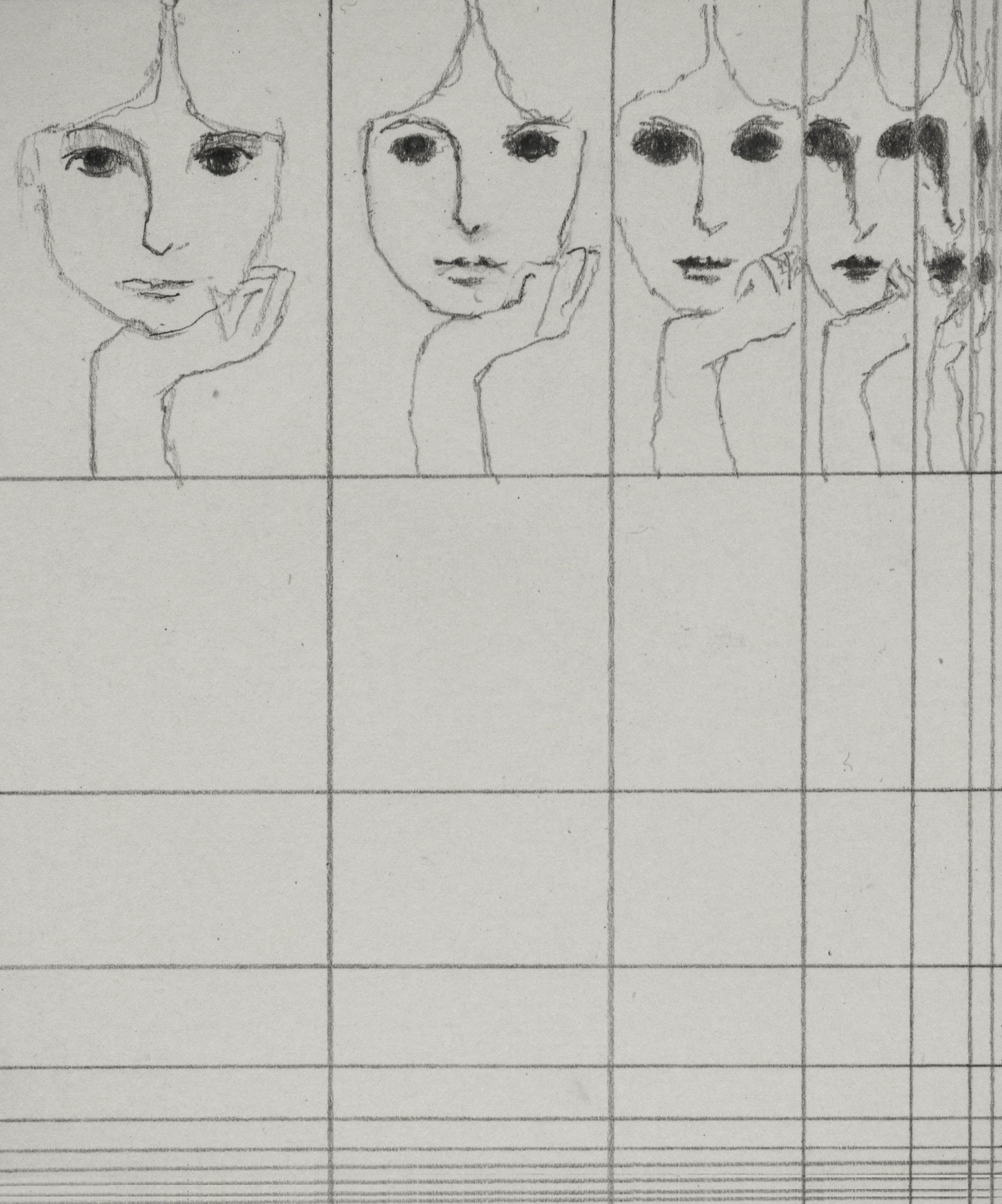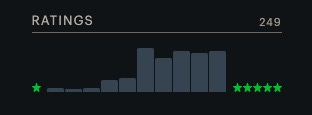multiple hot takes and rants
bell curve letterboxd ratings, sex and haruki murakami, a misconception about walkable cities, the female gaze
i’ve had this draft open for weeks in a tab and i keep pasting random things in it as the days pass. it’s finally time to organize it into a cohesive article, mostly because the words started flowing1 after i started writing about letterboxd (i rewatched a lot of my favorite movies this holiday season).
the rants sound unhinged but i promise i have nothing against you if you do things i disagree with. it’s not that serious.
your letterboxd ratings should not be a bell curve
hot take: your personal letterboxd rating distribution graph should be heavily weighed toward the 5-starred end of the axis. as in, most of the movies you’ve watched should be 4-5 stars (to you). you should spend most of your movie-watching time consuming films that provide immense value or enjoyment to your life.
imagine if there was a rating social media app for music, and on that app you log tons of mid songs that you don’t hate but you don’t love and there are only a few songs at the top of your list. you spend most of your time discovering/listening to music you feel “ehh” about, and you only know a tiny collection of special songs. that wouldn’t make sense. given that you listen to a lot of music and you know what kind of music you love, you listen to a lot of music you love. therefore, you should have a huge collection of songs you love. so on this hypothetical letterboxd-for-music app, you should rate a lot of songs 4+ stars and only a few songs <=3 stars. you wouldn’t go out of your way to find a bunch of music that doesn’t do anything for you.
it should be the same for movies. if your letterboxd rating distribution looks like a bell curve, i have to ask . . . why do you waste hours watching so many mediocre2 films? why would you waste your precious life watching films that are fine?
sure, maybe you knew nothing about the film before starting. or you’re a fan of the director, but their recent work was unexpectedly bad. let’s be honest, you can usually tell if you’re going to enjoy a movie in its first 10-20 minutes. when i can tell a movie is going to be worthless (to me), i stop watching it. i stop wasting my time. and if you already know the movie is slop/drivel (e.g. mainstream-industry studio-driven movies), don’t go to the theater to support it.
the only caveat to this is if it’s your job to be a film critic and watch everything that’s coming out nowadays so that you can write a review on it or if you have an audience that listens to your thoughts on arts & culture, by all means, watch mediocre movies so that you can start discourse about films. but if you watch mid movies because you feel like you need to “save” your 4/5 stars for movies that really “deserve” it (scarcity = value), then i must remind you that watching more mid movies doesn’t make your favorite movies more special, it just makes you waste more of your life and prevents you from enjoying good movies more deeply.
haruki murakami and sex in our cultural zeitgeist
it annoys me when people who have never read a single murakami book judge you for reading murakami.
if you haven’t read him, how do you know he’s misogynistic?
seems questionable to me.
sure, that’s what the new york times headline says. when’s the last time you consumed a primary source? i don’t respect people who get all their information about books and films from secondary sources. they’re not in it for the love of the game.
i don’t respect people who only know about books that are “signalers” of the “correct” aesthetic/moral/political/cultural zeitgeist. i don’t respect people whose taste is obviously carefully curated by the current pop culture atmosphere of the moment. i am not immune to this either, my opinions are influenced by trends, but they are not limited to the mainstream ideologies touted by the most popular influencers on social media.
also, gen-z is so sensitive to sex nowadays. just because a book has sex in it doesn’t mean it’s immoral.
quick tangent about goodreads
in a similar vein, setting book reading goals on goodreads is stupid. that’s why i always set my goal to be two books for the year. i’ll be happy if i read two books. reading is not the same as going to the gym. making your book numbers stack up for the sake of reading more books is adjacent to over-consumption and over-consumerism.
there is nothing honorable about increasing the quantity of books you read in a year. instead, you should be increasing the quality of the books you read.
if you only read one book the whole year but that book was anna karenina, that would be a cool accomplishment. but if you read twenty books this year in the same genre as the seven husbands of evelyn hugo, you basically did the equivalent of watching four seasons of gossip girl on netflix.
establishing my credibility
my friends know i’m a loyal murakami fan. i’ve been reading him since i was 14. i first read the wind-up bird chronicle when i was a sophomore in high school, and i still consider it his magnum opus. my next favorites are, in order, a wild sheep chase, kafka on the shore, colorless tsukuru tazaki, and hard-boiled wonderland & the end of the world. my least favorites are norwegian wood and his recent short story anthology.
i don’t think his books are as essential for your understanding of the human condition as classics like east of eden by john steinbeck or journey by moonlight by antal szerb (two of my fav books of all time), but they are really good at romanticizing the mundane (cooking, ironing), immersing you in a japanese slice-of-life episode, and transporting you to a parallel universe where people act like weird things are normal. i’ve always been able to relate to his characters and feel their emotions vividly. the conversations they have are poignant and interesting. the dialogue flows smoothly and authentically. he doesn’t need gimmicky stylistic crutches (examples: flowery or fragmented sentences, not using quotation marks) to make his characters distinctive. the characters are believable people with rich inner lives and eccentric backstories. as a result, i feel truly immersed when i read murakami.
as such an avid reader of his, of course i’ve encountered minor things that have rubbed me the wrong way—there was a part about socialism/living in a commune that he painted very negatively in 1Q843, and he made a feminist group in Kafka on the Shore be “narrow-minded”—but those are just nitpicks. overall, i don’t think murakami is a bad person.
sex is not inherently immoral
it’s controversial to proudly announce you’re a fan of haruki murakami, due to the blatantly “man-author” way he writes many female characters. there is indeed a common theme where almost all the women in his books are related to sex, or, if the main character is a man, he has sex with all the women in the story.
murakami explores many taboo sexual themes across his works—sex with escorts/sex workers, unintentional wet dreams, sex between platonic friends, oedipus-like attraction to your mother or sister, marital infidelity, attraction to young girls, and strange fetishes. i would go so far as to say that questionable, almost illegal, sexual situations are an irreplaceable facet of his style. it’s okay. it’s okay because it’s not real. it’s fiction. it’s not real.
my hot take is: it’s good to explore these sexual themes, in fact, his books are better because of it. i usually never see these themes approached in his way in any other media (nonchalantly, dream-like, surrealist), so not only is it a breath of fresh air, it makes me morbidly curious, spell-bound, fascinated. in fact, it’s important to explore media that disturbs us, that we find morally abhorrent, and that exposes us to worldviews that are wrong or crazy. how could we fully delve into the human condition without doing so? and why would you bore yourself by only consuming media that reinforces the echo chamber of ideas and stories that dominate our current cultural zeitgeist?
you read to see what it’s like to live other people’s experiences. why would you limit yourself to reading things you already agree with? the point of reading is to be introduced to ideas that call into doubt your own mindset and moral principles. otherwise, how do you know your own moral principles are correct? you should be able to clearly articulate why you believe a particular principle is good or bad, not because it’s the status quo. for example, why is cannibalism bad? you can’t just say, “how dare you ask that! it’s obvious,” as that illogical argument has been used to justify homophobia and sexism in history.
furthermore, something that happens in a book that you disagree with is not a valid reason to think that the book is bad. if an author writes about a serial killer sympathetically, does that mean you can’t read it because you don’t support murder? of course not. just because the author depicts a murderer’s point of view to make you understand their actions/motivations doesn’t mean the story is off-limits and the author should be blacklisted.
my other hot take is: murakami is a good author and writes women with just as much color and detail as the men. in many cases, he develops them better than the men (example: creta kano in wind up bird). they have rich personalities, varied motivations, and undeniable agency, the extent to which depends on whether the protagonist is male or female. personally, i laugh off the misogynistic parts. i see them more as embarrassing for murakami and reflective of 1980s japanese society as a whole than an indictment on his writing. i get an amused secondhand embarrassment, like “haha, classic murakami, this is so typical of him.” i take it with a grain of salt. what he does well more than makes up those parts.
a misconception about walkable cities
walkable cities are not about forcing people to drive less. urbanism is about giving people who don’t want to drive the freedom to not drive and people who do want to drive the freedom to drive. it’s about choice.
it would literally help drivers if fewer people drove because there’d be less traffic, less road rage, and fewer pedestrians and cyclists moving around in the car lanes where you have to concentrate super hard not to hit them, you can enjoy cruising around, and ideally there would be planters separating the bike lanes from the car lanes so you don’t have to worry about hitting anyone and they don’t have to worry about getting hit. plus if there are trains, everyone goes on the subway underground and it would help car traffic so much. tram-lines aboveground too don’t interfere with cars, and if they’re built on grass they make the streets more beautiful to look at from your car window.
it would be a win-win-win for every single person.
the netherlands = the best country in the world for drivers
the netherlands is the best country to drive in, despite being famous for its amazing bicycling infrastructure.
unrelated: the best part about riding a bike is that you’re both a pedestrian and a vehicle at the same time (depending on whichever is not convenient at the moment).
the female gaze
someone said their working theory of the female gaze was “posture, attention, energy, gentleness, confidence, allure, masculine energy, boldness, leadership, and ownership.”
personally i think competence and intelligence should be additions to the female gaze list. confidence, boldness, and leadership look like arrogance and pride without the competence to match, which is unattractive.
conversely, if there is competence but no boldness/leadership, that’s still attractive because it could be seen as humility/not being vain.
dating apps
dating apps don’t work because you first need to have an admiration/respect for the other person organically, before you ever consider them in relation to yourself. and impressing you on the dating app itself doesn’t count. that just means they’re good at marketing themselves.
before you begin evaluating them as a romantic interest or even as a friend, you need to be impressed by them, they need to do something impressive or hot that makes you like them, otherwise it’s too forced. even a healthy amount of jealousy for their skill/talent/competence is good, something that motivates you to improve yourself and grow and be inspired by them.
writing vs. speaking
i’ve always felt i can’t convey my thoughts as effectively through speech as i can through writing. it’s because i was quiet growing up so i didn’t have much practice converting my thoughts into spoken words. i feel dumb when words exit my mouth, but the words coming out of my keyboard carry my real essence.
daenerys should’ve had purple eyes
i will never forgive the game of thrones production team for not having emilia clarke wear purple contacts throughout the show because the crew thought it was too off-putting4. that’s the whole point!!!! targaryens’ purple eyes are supposed to creep you out.
targaryens’ silver-gold hair and violet eyes signify the blood of old valyria. they are the visual proof that daenerys is different from regular humans in very concrete ways (impervious to fire), so exotic that she’s almost otherworldly. it should be scary to see her because purple eyes are so unnatural and unusual.
emilia clarke’s natural green eyes are pretty, but now everyone thinks daenerys is just a platinum blonde.
unrelated: eren yeager is what bran should’ve been in the end.
do not rake your leaves
hot take: do not rake your leaves, dead leaves are important for the ecosystem. you should leave them on the ground so that they can be absorbed back into the earth and the nutrients can be returned to the soil to create new leaves in the spring.
the alternative is you rake your leaves, put them into bags, then they get sent to the landfill and rot there in an anaerobic environment, turning into toxic sludge.
recommendations
bella’s podcast check please! is hilarious, her recipes are gorgeous, and her taste in general is an inspiration to me—
madelynn de la rosa’s eric-rohmer-inspired filmography has been an inspiration to me for over 6 years, and her cake ceramics and meditation content are great too—
, https://www.madelynn-delarosa.com/in love with the breakfast scene from phantom thread. it’s so soothing and satisfying, it just scratches an itch in my brain, and the soundtrack is magnificent.
i’ve been backed up writing-wise. all the words have been accumulating in my system for the past few weeks. i’ve been word-constipated, and now the blockage has been removed and the words are coming out in a torrent.
mediocre to you personally. i acknowledge everyone has their own tastes, and i’m not trying to impose my personal opinion of what’s mediocre on everyone.
i’m on this part of 1Q84 and i have a problem with how murakami implies that communists are braindead:
first the default assumption that if you live in a commune you have no critical thinking skills.
second that being told what to do is undesirable. most people would love for someone else to figure out the hard part for them and simply follow orders if it means living a comfortable life, and there’s nothing wrong with that.
they could have at least edited in purple irises in post-production.






im fully stalking u from a comment section if im being honest n this was such a fun piece that gave me sm thoughts to chew on !! so glad to find refreshing writing on here !!
YES about the walkable cities! As a pedestrian and public transit lover (especially trams), I appreciate you making it clear that it's a win-win. I wish more people talked about this. Also relatable and appreciated: "the words coming out of my keyboard carry my real essence"